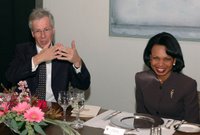"The Liberal administration looked on energy as an annoyance, which makes sense in that their stronghold, central Canada, is made up of energy consumers. It was the job of the natural resources minister to keep the consumers happy," Mr. [Frank] Atkins [, a University of Calgary economist] said. "The West is an energy producer, so now we'll get the proper perspective on that.The choice of natural resources minister may resurrect the old rivalry between the established oil producers in Alberta and the new centres of oil wealth on Canada's east coast.
Ian Doig, an oil analyst based in Calgary has been a long-standing critic of oil and gas exploration and development offshore Nova Scotia and Newfoundland and Labrador. Doig is familiar in Newfoundland and Labrador as a constant critic of the Hibernia project. His views, which often reflect the general opinions in the Alberta oil patch, haven't changed in the past 20 years. As he told the Globe and Mail recently about increased interest by Husky in the east coast offshore:
However encouraging the signs, the fact remains that there has not been a significant discovery of oil offshore of Newfoundland in two decades, said Ian Doig, a long-time observer of the East Coast industry and publisher of the industry newsletter Doig's Digest.Having an Albertan as natural resources minister could also reinforce efforts to draw more and more Canadian and American oil and gas policy attention to Alberta.
Mr. Doig said any deep-water exploration is difficult, but that the Orphan Basin is tough even by that standard. Chevron said the ocean in the Orphan Basin is five to 25 times as deep as the Jeanne D'Arc Basin.
He said Newfoundland's chief success in recent years has been to secure royalty concessions from the Liberal federal government.
"They've been more successful with energy riches in Ottawa than offshore."
Alberta's success in promoting its own oil and gas resources are easy to see. Both the Government of Alberta and the federal Liberal government worked to attract American interest in the oil sands, including planning a visit by vice-president Dick Cheney last fall.
Veteran United States Senator Orrin Hatch (R-Utah) has already predicted Canada will surpass Saudi Arabia as the leading supplier of oil to the United States. But Hatch's attention is firmly focused on Alberta, describing it as the 800 pound gorilla sitting immediately above Montana.
CBS News' 60 minutes also profiled the oil sands recently, describing them as likely to become more important to the United States than Saudi Arabia.
Try finding any similar attention being paid to the east coast offshore. True there has been an uptick in calls for exploration bids, but there is nothing to rival the recent attention paid to Alberta in the major markets south of the border.
The east coast oil and gas industry still faces significant challenges, not the least of which is making its regulatory regime both effective and competitive. It simply isn't clear whether or not the provincial government is interested in a genuinely competitive, modern oil and gas industry. Turning the province's hydro corporation into a neophyte oil and gas company, the premier's instance on piling on local benefits to projects, and the nomination of Andy Wells to head the offshore regulator all suggest a return to a policy straight out of the unsuccessful past.
That policy is distinctly out of step with the new federal Conservative government's philosophy of economic development and that is ultimately where the problem may rest. Alberta is surging ahead on an agenda of innovation, local entrepreneurship and attracting new outside investment. That matches perfectly with the Conservative view.
What happens offshore Newfoundland and Labrador in the next few years will depend very heavily on who sits as the federal natural resources minister come February 6. If it winds up being an Albertan or someone sympathetic to Alberta's approach - either of which is almost a certainty - Newfoundland and Labrador might find itself in a difficult spot.
We've been in that same spot before and we don't need to go there again.






